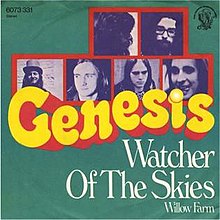Watcher of the Skies
| "Watcher of the Skies" | ||||
|---|---|---|---|---|
 |
||||
| Single by Genesis | ||||
| from the album Foxtrot | ||||
| B-side | "Willow Farm" | |||
| Released | 6 October 1972 | |||
| Recorded | August 1972 | |||
| Genre | Progressive rock | |||
| Length |
7:23 3:42 (single version) |
|||
| Label |
Charisma/Virgin(UK) Atlantic(U.S.) |
|||
| Songwriter(s) | Tony Banks, Phil Collins, Peter Gabriel, Steve Hackett, Mike Rutherford | |||
| Producer(s) | David Hitchcock of Gruggy Woof | |||
| Genesis singles chronology | ||||
|
||||
"Watcher of the Skies" is the first track on and the only single from Genesis' 1972 album Foxtrot.
The title is borrowed from John Keats' 1817 poem "On First Looking into Chapman's Homer":
Then felt I like some watcher of the skies
When a new planet swims into his ken;
The song was frequently used to open the group's live performances and features as the first track on their 1973 live album Genesis Live. The song opens with a Mellotron intro. According to Tony Banks, the introductory section was intended to take advantage of idiosyncrasies in the tuning of the Mellotron model he was using at the time:
It was intentionally melodramatic to conjure up an impression of incredible size. It was an extraordinary sound. On the old Mellotron Mark 2 there were these two chords that sounded really good on that instrument. There are some chords you can't play on that instrument because they'd be so out of tune. These chords created an incredible atmosphere. That's why it's just an incredible intro number. It never sounded so good on the later Mellotron.
The two chords in question are Bmaj7/F# and C#/F#. The long keyboard introduction crossfades into the main ensemble section, which features a prominent single-note staccato pattern in a 6/4 time signature (reminiscent of the 5/4 rhythmic pattern from "Mars" in Gustav Holst's The Planets suite) played over a pattern of sustained organ chords. Following the vocal sections of the song, there is an unusual polyrhythm part, where the staccato riff changes to 8/4 time, played against a Mellotron/organ chord part in 6/4.
The lyrics were written by Banks and Mike Rutherford during a soundcheck for a gig in Naples. While they were surveying the deserted landscape of the airfield where they were rehearsing, they wondered what an empty Earth would look like in this state if surveyed by an alien visitor. The lyrics were influenced by the Arthur C. Clarke 1953 science fiction novel Childhood's End (as were Pink Floyd's 1972 "Childhood's End" and Van der Graaf Generator's 1976 "Childlike Faith in Childhood's End").
...
Wikipedia
